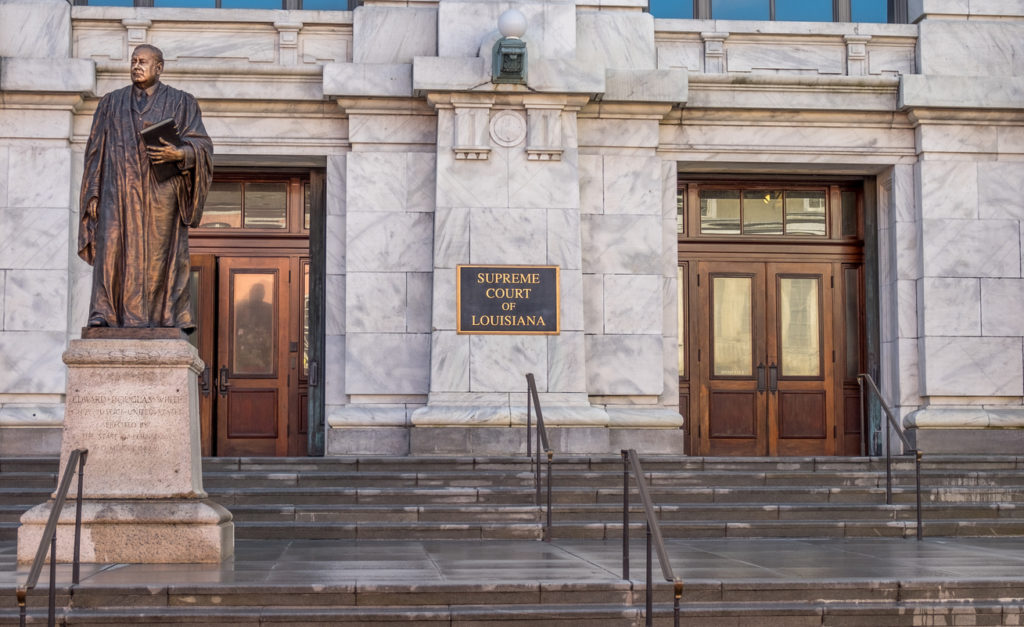The civil rights law known as Title VI faces a significant legal hurdle in Louisiana. In January, a federal judge prohibited the U.S. Environmental Protection Agency (EPA) and the U.S. Department of Justice (DOJ) from addressing preliminary findings of discrimination that would have relieved some of the health and environmental burdens communities in “Cancer Alley.” While we wait to see how Louisiana v. EPA develops as it moves through the judicial system, this blog post breaks down why Title VI is crucial and the environmental justice implications of this case.
Title VI and “Cancer Alley”
Title VI of the Civil Rights Act of 1964 is essential for environmental justice communities. At its core, Title VI prohibits recipients of federal funding, including state and local governments, agencies, and/or businesses, from taking actions — or refraining from taking actions — that discriminate on the basis of race, color, or national origin. Title VI prohibits both actions motivated by intentional discrimination and actions that result in disparate impacts on protected classes, regardless of intent. If a federal agency finds that a funding recipient has engaged in such a discriminatory practice, the agency can amend, suspend, or revoke funding and impose additional requirements on recipients to prevent future discrimination, among other potential types of remedies. Since the 2001 Alexander v. Sandoval case, the Supreme Court effectively eliminated the private right of action for allegations of disparate impact. Instead of turning to the court for relief, advocates must follow the complicated and often underfunded administrative review process by which federal agencies’ Title VI offices investigate and resolve complaints of alleged discriminatory conduct.
This latest case, Louisiana v. EPA, is based on the EPA’s closure of two complaints from “Cancer Alley,” which would significantly restrict the administrative complaint process.
Coined for its high concentration of petrochemical facilities spewing disproportionate amounts of cancer-causing air pollution, “Cancer Alley” is between New Orleans and Baton Rouge. Residents living in Cancer Alley, 58.4 percent of whom identify as African American, experience higher cancer risks, respiratory complications, and other health disparities.
For decades, residents in St. John the Baptist and St. James Parishes have advocated to prevent the permitting of new and the expansion of existing petrochemical facilities in Cancer Alley. The articles linked here dive into the communities’ fight to get the EPA to open an investigation into these civil rights violations and the agency’s abrupt closure of the complaint stemming from Louisiana’s court challenge.
Here are the three main takeaways from the January ruling:
- Title VI remains a viable strategy for environmental justice communities outside of Louisiana, and programs in Louisiana not funded by EPA or DOJ.
Since EPA started to enforce Title VI regulations over 20 years ago, the agency has not once used its authority to withhold funding due to a finding of discrimination. Out of hundreds of complaints filed with EPA, the agency only made one preliminary finding of discrimination. Over the years, EPA’s Title VI program has received criticism for its slow processing of complaints and significant backlog of unresolved complaints, some of which have taken years – and at times decades – to conclude investigations.
Advocates regained some hope after the Biden Administration signaled through Executive Order 14096 an increased commitment to using Title VI to advance environmental justice, coupled with significant staffing increases at the Office of External Civil Rights Compliance. Advocates have seen more complaints accepted by the EPA in less time, and the agency taking a harder look at complaints. The agency has also shifted to ensure complainants are informed and consulted throughout the process. Since the decision in this case, EPA has received six Title VI complaints and is reviewing three complaints in Georgia. Thus, Title VI remains alive in other states, and EPA can and should continue to accept, investigate, and resolve complaints of discriminatory practices.
For now, the recent ruling closes the door on the significant reforms to follow disparate impact requirements and cumulative impact assessments Louisiana was initially open to making. Advocates rightfully fear that Cancer Alley will continue to be a sacrifice zone without these reforms. The door remains open for advocates in Louisiana to challenge intentional discrimination under Title VI, even though intentional discrimination can be very difficult to prove. Communities in Louisiana could still file Title VI complaints alleging disparate impacts on Louisiana’s funding implementation from other federal agencies. The ruling also in no way prevents EPA from actively engaging complainants and communities, more broadly, in the resolution of Title VI complaints. EPA and DOJ can and must continue to rebuild efforts with impacted communities.
- This attack on Title VI fits within the broader conservative agenda.
One thing is clear: this case is part of a playbook by the conservative movement to attack affirmative action, civil rights, and, more broadly, the administrative state (see our Leading with Race work). The ruling in Louisiana v. EPA is a continuation of their decades-long strategy to appoint judges and move conservative legal theories from obscure, academic side conversations to established precedent.
Opponents of racial and environmental justice have been working diligently for a long time to ban the use of disparate impact analysis1. It is also possible that Louisiana’s strategy could inspire other states where the EPA has pending or has recently closed Title VI complaints. If this happens, we will begin to see an unequal application of Title VI on a state-by-state basis, particularly in states refusing to comply with their civil rights obligations.
In this case, Louisiana’s lead attorney hinted that they are preparing to take this case up to the Supreme Court. This case could likely join the docket of cases trying to chip away at the administrative state through the Courts’ increased usage of the major questions doctrine – a legal principle that holds that federal agencies cannot promulgate rules or regulations that have significant economic or political impact without an express statement of intent to delegate such power from Congress.
- Advancing environmental justice through other policy and legal tools will be necessary.
Both short-term and long-term strategies are needed to advance environmental justice. It’s important to note that advocates continue to call on the EPA to use its full authority under Title VI to enforce and monitor compliance with civil rights requirements in environmental justice communities. For now, the EPA can also affirmatively advance environmental justice by revising existing and proposing new regulations, policies, and guidance documents that can improve the outcomes for disadvantaged communities in its programmatic work.
Given the attacks on Title VI, advocates must also begin to plan a long-term strategy and use other legal tools that can provide benefits to environmental justice communities. The Fair Housing Act’s Affirmatively Furthering Fair Housing and new regulatory changes to the National Environmental Policy Act are promising avenues communities can use to address environmental injustice actively. More generally, we must continue to work at the local, state, and federal levels to pass race-conscious laws and policies that can begin to undo systemic barriers and reduce the health burdens of environmental justice communities.
As we wait to see this case play out in the court system, our movements must plan short- and long-term approaches to respond to these attacks and collectively transform the legal and regulatory systems to further environmental justice.

